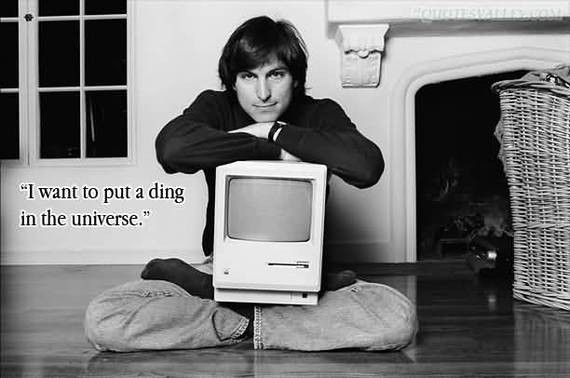"Apple Computer came to market yesterday and won," the New York Times wrote in 1980. On this day, Steven P. Jobs' (co-founder/major shareholder) net worth shot to $217 million. He was 25-years-old.
Jobs has been covered ten ways to Sunday, but I felt it important to highlight a quality in him that was baked into many of his decisions.
I'm going to cover Steve Jobs' number one innovation. His top innovation does start with an I, but probably isn't the product you're thinking about.
Twenty-four years before the New York Times wrote that headline, Jobs was given up for adoption. Jobs' biological mother demanded the parents who adopted him would send him to college. The Jobs family agreed to send him to college when of age. When it was time for college, Jobs was sent to Reed College. Typical to Jobs, he questioned whether this was the right decision: "All of my working-class parents' savings were being spent on my college tuition. I had no idea what I wanted to do with my life and no idea how college was going to help me figure it out. And here I was spending all of the money my parents had saved their entire life. So I decided to drop out and trust that it would all work out okay."
Jobs decided college wasn't the right decision, and he dropped out.
Jobs then went on a self-discovery exploration to India with a friend. The trip consisted of visiting monk after monk, resulting in Jobs embarking on a deep journey inside himself. Juggling whether to become a monk, Jobs was advised by a monk that the monk-life wasn't his path.
This India trip is where I believe Jobs learned two of his top skills that led to his top innovation.
- Jobs created his vision. This vision led to clarity on whom HE needed to be in order to manifest his vision, leading to actions he needed to focus on now and next.
In other words, his vision was like a garden, and Jobs needed to figure out what type of gardener he needed to be in order to nurture his garden. He then needed to figure out what seed to focus on, then plant and water.
He was able to condense his vision into an elevator type speech format that was pitch to investors and the world. Through Apple and Pixar, Jobs was able to raise incredible amounts of capital through his vision which allowed him to bring this vision to the mass market.
- Jobs had a willingness to invest in loss.
The Eastern world has rapidly advanced consciousness releasing their ego. One result in doing this is releasing your own need for acceptance. This technique allowed Jobs to invest in loss. Josh Waitskin, Grandmaster chess Champion/Prodigy, describes this in his book, The Art of Learning:
My response is that it is essential to have a liberating incremental approach that allows for times when you are not in a peak performance state. We must take responsibility for ourselves, and not expect the rest of the world to understand what it takes to become the best that we can become. Great ones are willing to get burned time and again as they sharpen their swords in the fire. Consider Michael Jordan. It is common knowledge that Jordan made more last-minute shots to win the game for his team than any other player in the history of the NBA. What is not so well known, is that Jordan also missed more last-minute shots to lose the game for his team than any other player in the history of the game. What made him the greatest was not perfection, but a willingness to put himself on the line as a way of life. Did he suffer all those nights when he sent twenty thousand Bulls fans home heartbroken? Of course. But he was willing to look bad on the road to basketball immortality.
India was so important to learning these skills that when mentoring Mark Zuckerberg, Jobs gave him important advice that reflected the importance of the personal journey inward:
Early on in our history when things weren't really going well--we had hit a tough patch and a lot of people wanted to buy Facebook--I went and I met with Steve Jobs, and he said that to reconnect with what I believed was the mission of the company, I should go visit this temple in India that he had gone to early in the evolution of Apple, when he was thinking about what he wanted his vision of the future to be. (Zuckerberg, September 2015, according to Business Insider.)
Jobs' greatest innovation was himself. He had to create his vision, the person who could accomplish such feats, and acquire the discipline to act on both. Finally, he had to develop the Zen-like mindset to be willing to lose in order to open the possibility, for one day, to win.
Jobs' vision was to put a ding in the universe. Let every text message be a reminder to recommit to your vision.
What's your vision for the world? Who do you need to be to achieve this vision? What do you need to let go of in order to achieve this vision?

